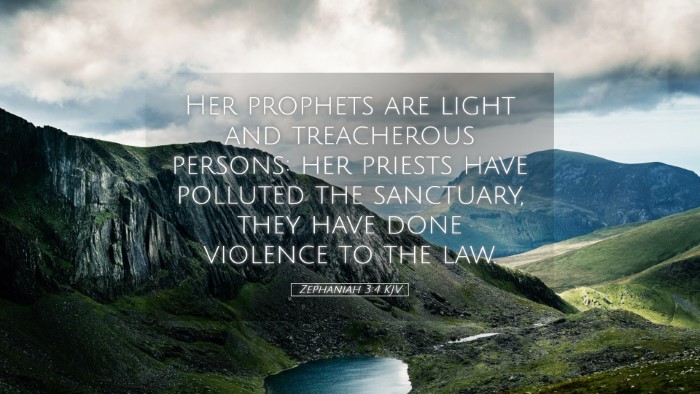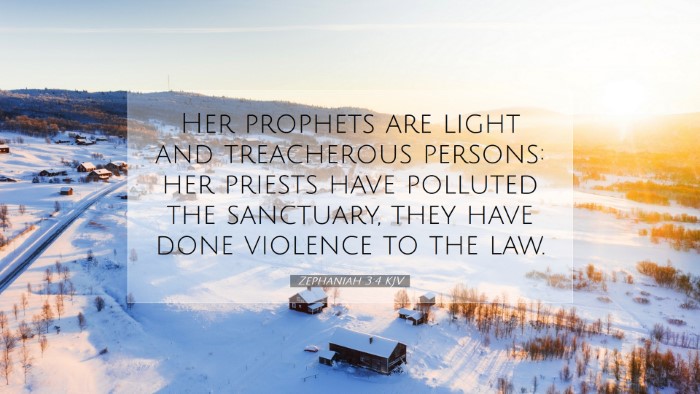Old Testament
Genesis Exodus Leviticus Numbers Deuteronomy Joshua Judges Ruth 1 Samuel 2 Samuel 1 Kings 2 Kings 1 Chronicles 2 Chronicles Ezra Nehemiah Esther Job Psalms Proverbs Ecclesiastes Song of Solomon Isaiah Jeremiah Lamentations Ezekiel Daniel Hosea Joel Amos Obadiah Jonah Micah Nahum Habakkuk Zephaniah Haggai Zechariah MalachiZephaniah 3:4
Zephaniah 3:4 KJV
Her prophets are light and treacherous persons: her priests have polluted the sanctuary, they have done violence to the law.
Zephaniah 3:4 Bible Commentary
Commentary on Zephaniah 3:4
Zephaniah 3:4 states: "Her prophets are light and treacherous persons: her priests have polluted the sanctuary, they have done violence to the law." This verse serves as a potent indictment against the leaders of Jerusalem, revealing their moral and spiritual failures, and highlights the effects of these failings on the nation as a whole.
Contextual Background
The Book of Zephaniah is a prophetic work that addresses the impending judgment of God upon Judah, primarily due to its idolatry and social injustice. As a minor prophet, Zephaniah's message carries significant weight in understanding the nature of divine judgment and the call to repentance.
Historical Setting
Zephaniah prophesied during the reign of King Josiah (640-609 BC), a time characterized by rampant idolatry and corruption within both political and religious institutions. There was a need for profound reform and an awakening of genuine worship among the people of Judah.
Verse Analysis
This verse contains a three-part condemnation of the leaders in Jerusalem, each detail serving to enlarge the understanding of their failure:
- The Prophets: Zephaniah criticizes "her prophets" as being "light and treacherous." This implies that the spiritual leaders have not only failed in their advisory role by leading the people astray but have also been deceitful in their conduct. Matthew Henry notes that these prophets, rather than being messengers of God, have become unreliable, thus failing to convey God's truth to the people.
- The Priests: The accusation against the priests for polluting the sanctuary suggests a profound corruption within the worship practices. Their actions signify a breach of the sacred trust placed upon them. Adam Clarke emphasizes that this pollution reflects disregard for the holiness that should characterize the worship of Yahweh.
- Violence to the Law: The phrase "they have done violence to the law" indicates not only a perversion of justice but also a systematic dismantling of the very foundations of their covenant relationship with God. Albert Barnes highlights that this reflects a more general abandonment of the ethical teachings found in the Mosaic law, which was meant to guide their societal functioning and relationship with God.
Implications of the Prophetic Judgment
The implications of such leadership failures are profound. The indictment against the prophets and priests underscores the vital role of righteous leadership within the community of faith. Where leaders falter, the people are led astray, ultimately resulting in communal catastrophe.
Call for Accountability
This portion of Zephaniah's message can be viewed as a call for accountability within spiritual leaders. Both Matthew Henry and Albert Barnes stress that with great responsibility comes great accountability before God. The impact of the leaders' actions or inactions can lead entire nations to judgment.
Contemporary Application
For pastors, students, and theologians today, Zephaniah 3:4 serves as a reminder of the necessity for integrity and truthfulness in spiritual leadership. Some insights for modern application might include:
- Vigilance Against Corruption: Leaders must be vigilant against the corrupting influences that can infiltrate their ministries.
- Commitment to Truth: There must be an unwavering commitment to teaching the truth of Scripture, even when it is unpopular or challenging.
- Holiness in Worship: This calls for a renewed emphasis on holiness in worship practices, ensuring that God is honored and not treated lightly.
Encouragement for Renewed Faithfulness
The underlying hope in Zephaniah is found in the promise of restoration for those who return to God. In proclaiming judgment, there is always the potential for repentance and renewal. For scholars and theologians, this aspect invites deeper study into the themes of redemption that permeate the prophetic literature.
Conclusion
Zephaniah 3:4 serves as a sobering reminder of the responsibilities borne by spiritual leaders and the far-reaching effects of their conduct on the community of believers. In drawing lessons from this text, pastors and theologians are encouraged to foster environments of accountability, integrity, and a genuine approach to worship. The voice of the prophet, sounding a warning call, calls us to reflect on our own practices and the state of our leadership within the church today.


